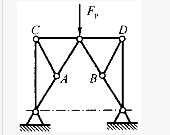问题
问答题
考生文件夹下存在一个数据库文件“samp2.mdb”,里面已经设计好三个关联表对象“tStud”、“tCourse”、“tScore”和一个临时表对象“tTemp”。 试按以下要求完成设计:
(2)创建一个查询,查找选课学生的‘‘姓名’’和‘‘课程名,,两个字段内容,所建查询命名为“qT2”。
答案
参考答案:步骤1:双击“在设计视图中创建查询”。添加“tStud”、“tCourse”、“tScorc”表,关闭“显示表”对话框,需要注意的是,虽然要查询的字段只在“tStud”、“tCourse”表中,但是必须把tScore加入才能建立联系,才能实现多表查询。 步骤2:分别在“tStud”表中双击“姓名”字段,在tCourse表中双击“课程名称”字段。 步骤3:单击“运行”按钮。单击“保存”按钮,保存输入文件名“qT2”。单击“确定”按钮,关闭“qT2”查询窗口。
解析:【审题分析】本题考查多表查询,考生必须要对多表查询的务件了解,从而才能实现在多个表中实现数据的获取.

